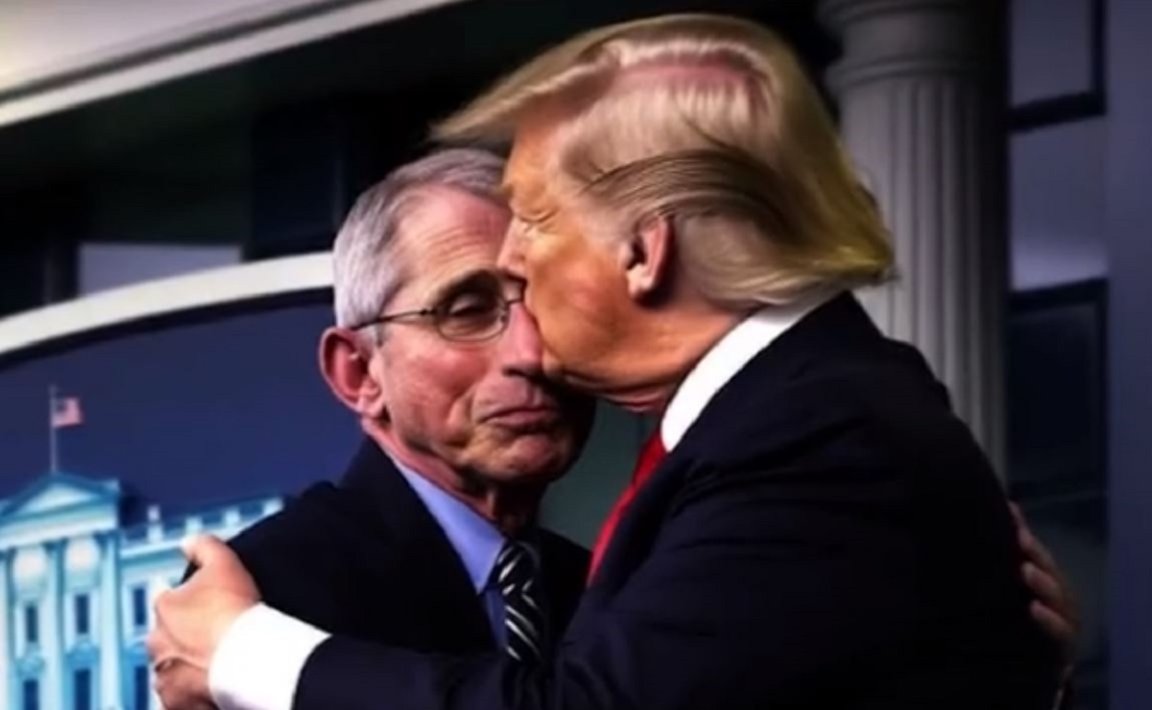
The mainstreaming of AI-generated imagery in political advertisements continues.
As reported by The Verge, the 2024 presidential campaign behind Florida governor Ron DeSantis has released a video advertisement featuring what strongly appear to be AI-generated images of former president Donald Trump kissing and embracing Anthony Fauci, the former White House chief medical advisor whose role in COVID-19 pandemic prevention and response has made him a target of right-wing conspiracy theories.
Anti-vaccine and anti-COVID restriction messaging has become a rallying cry on the right, although the vaccine was one of Trump’s most concrete accomplishments during his term. DeSantis, who became a political star on the right in part because of Florida’s lax COVID restrictions, has made Trump’s alleged coziness to Fauci — the other main face behind pandemic lockdowns and vaccination efforts, which many far-righters have painted as tyrannical — central to his presidential bid.
The video in question — which was first shared to Twitter on June 5 by the “DeSantis War Room, a Twitter account created last August by DeSantis aide Christina Pushaw — plays on these themes, juxtaposing clips of Trump firing contestants on his reality show with soundbites of the former president refusing to fire Fauci as well as imagery of the two figures alongside one another. And importantly, the videos of Trump on his reality show are marked as “Reality TV Trump,” while all other clips are marked as “Real Life Trump.”
“Donald Trump became a household name by FIRING countless people *on television*,” reads the video’s accompanying caption. “But when it came to Fauci…”
But according to an AFP fact-check, some of those images marked “Real Life Trump” — three, to be exact — weren’t “real” at all, and instead are overwhelmingly likely to have been AI-generated.
On closer inspection, the telltale signs of AI generation become clearer. In the phony photos — in all of which Trump is seen either kissing Fauci’s cheek, embracing the former medical advisor, or both — Trump’s hair is suspiciously blurry, while both figures’ skin is inhumanly smooth. And in one of the photos, the White House logo pictured in the background contains a bunch of scrambled nonsense letters (rather than, you know, words.)
But insidiously, the three fake images were not only pictured under text that said “Real Life Trump,” but were also juxtaposed alongside three real and similar photos of Trump and Fauci together — a decision that makes the fake photos seem all the more plausible.
“It was sneaky to intermix what appears to be authentic photos with fake photos,” Hany Farid, a professor at the University of California, Berkeley, told the AFP, “but these three images are almost certainly AI-generated.”
Folks in DeSantis’ camp have yet to confirm or deny the use of AI, and instead are hitting back with a heavy dose of Trump-targeted whataboutism.
“No campaign has pushed more misleading deepfakes, false photoshops, and outright fabrications than the Trump campaign,” Matt Wolking, a spokesperson for the DeSantis-supporting Never Back Down PAC, told the Verge. “It is 100 percent true that Donald Trump empowered and embraced Fauci — he even gave him a presidential commendation.”
When asked to confirm whether the images were in fact AI-generated, however, Wolking failed to answer, telling the Verge that they’d “have to ask the campaign.”
Similarly, in what appears to be an attempt at a clap back, Pushaw took to Twitter on Wednesday to share a screenshot of a recent Trump post to Truth Social in which the former president is seen sharing an obviously fake photo of DeSantis riding a rhino. (The term “RINO” is a popular right-wing acronym meaning “Republican in name only.”)
“I think this might be an AI-generated image,” Pushaw captioned the screenshot. “Who knows?”
And, well, sure, Trump definitely hasn’t been one to shy away from AI-generated imagery. Nor has the Republican National Convention (RNC), for that matter. But three wrongs don’t make a “whatever, he did it too,” and the concept of an image being plausible — as Wolking argues — versus the fact of an image being, uh, real are two very different things.
And besides, this isn’t a Trump versus DeSantis ethics debate. This is a debate about the ethics of using AI-powered deepfake tech in political messaging at all, especially in instances like this one where synthetic content hasn’t been overtly labeled as such.
Of course, whether deepfaked and otherwise AI-generated content will actually have much — if any — impact in the way of voter mobilization still remains to be seen. After all, most AI-made imagery is less than convincing.
But as a collective, we also seem to be moving closer to a world where deepfakes are more or less ubiquitous, and reality is simultaneously easier to manipulate and harder to parse. By DeSantis campaign rules, if you can’t find an image of a former president smooching a controversial top aide on the White House press stage, you can apparently just whip one with an AI image generator. Is that really how we want any presidential campaign to behave?
More on AI and 2024: Donald Trump Shares Slightly Misfigured AI-Generated Image of Himself Praying